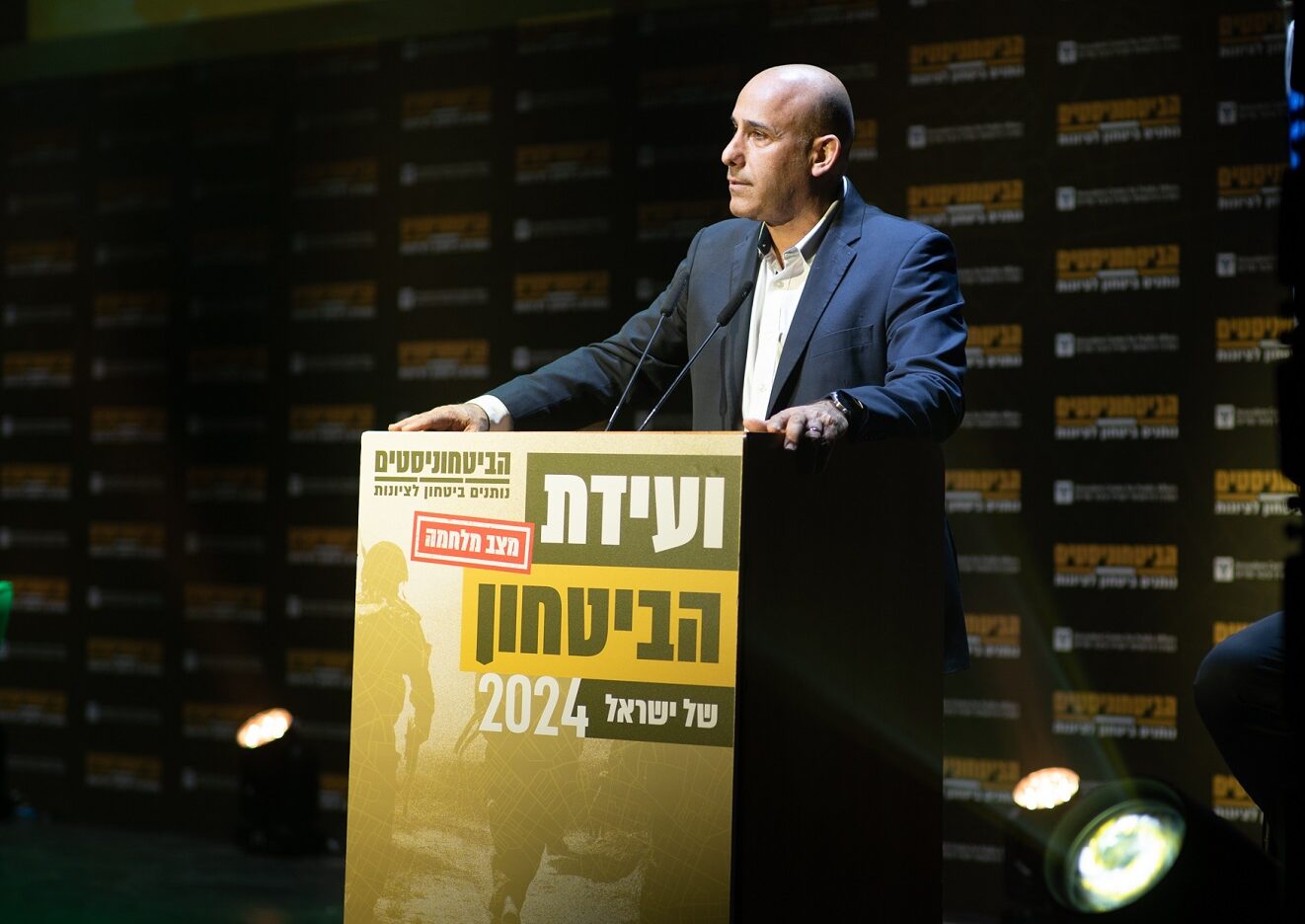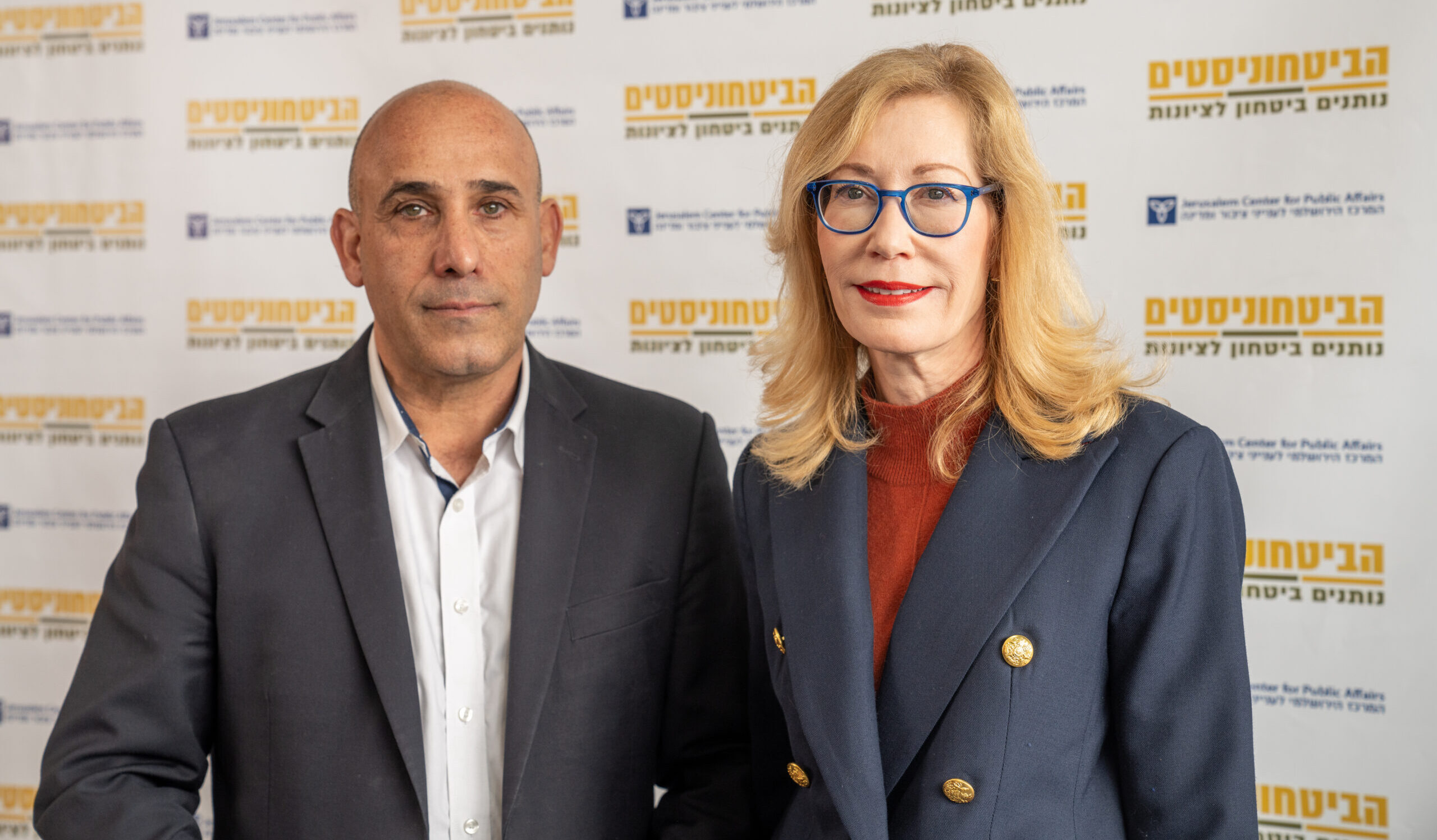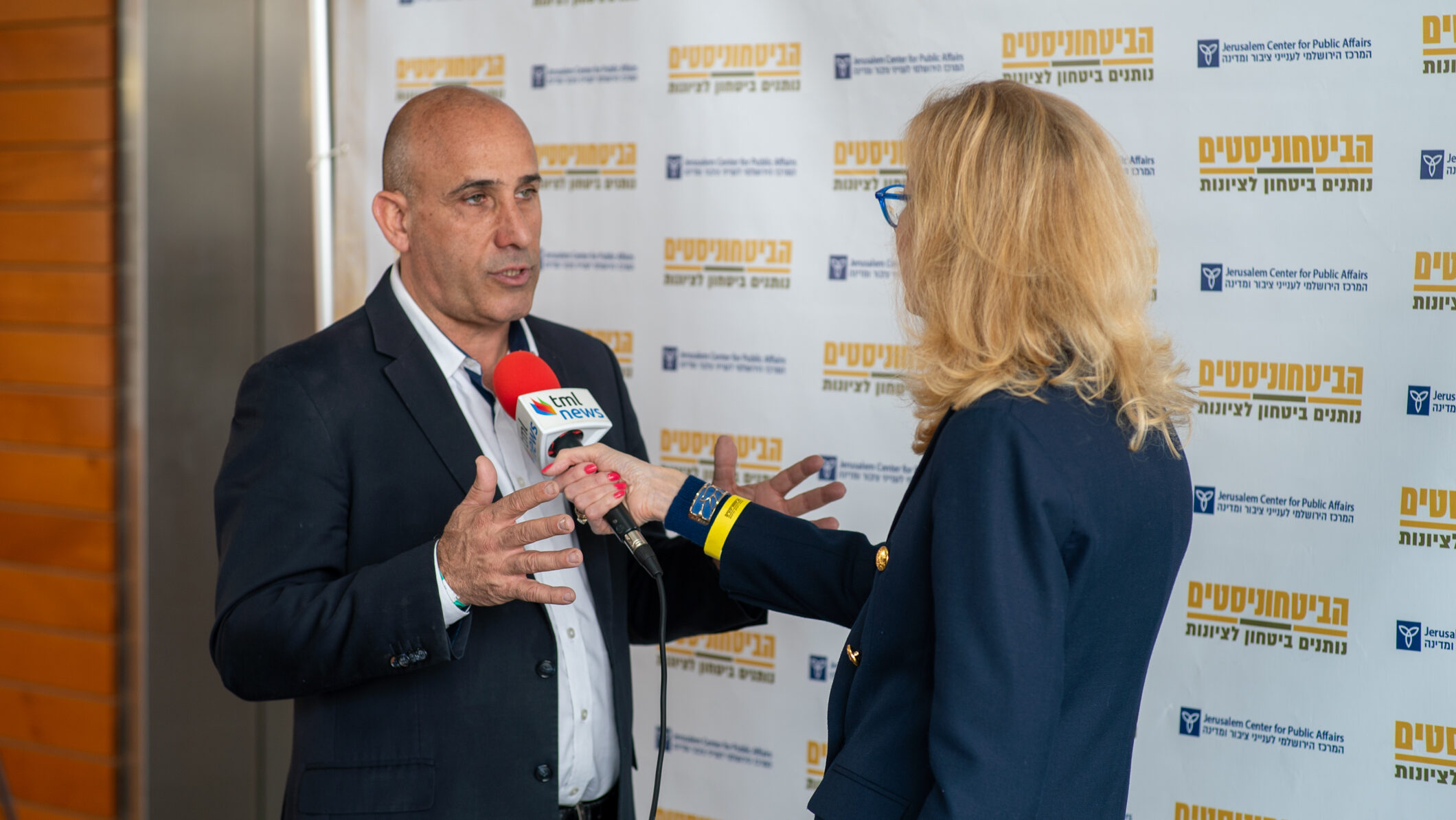Brig. Gen. Avivi to The Media Line: The World Must Push Hizbullah North of Litani River or It’s War
Speaking at a recent defense forum, Brig. Gen. Amir Avivi emphasized the need for a robust American-Israeli-Sunni coalition to address the broader global challenges posed by Russia, China, and Iran
Dozens of Israel’s top military thinkers gathered recently to discuss the next steps in the Israel-Hamas war and what is likely to happen after it ends at the Israel Defense Conference 2024, convened by the Israel Defense and Security Forum, a group of veterans and operatives from Israel’s security forces who focus on the country’s security needs.
Brig. Gen. (res.) Amir Avivi, a co-founder and chairman of the forum, addressed the conference and said that even after the conflict ends, Israel will need to retain full freedom to operate in the Gaza Strip, as well as retain full control of the Egypt-Gaza border to prevent the smuggling of weapons.
The Media Line met up with Brig. Gen. Avivi on the sidelines of the conference. Avivi said he viewed the conflict as part of a global war, involving Russian, Chinese, and Iranian challenges to the West. He advocates for a strong American-Israeli-Sunni coalition to counter this threat, and highlights the need for Israel’s self-reliance in defense production. He also shared his view that this is going to be a long war and that there is a significant chance of a wider conflict with Hizbullah in Lebanon.
TML: As chairman of this organization, IDSF, as the war is into more than 100 days, what is your impression of how Israel is faring since that horrible day on October 7?
Brig. Gen. Avivi: So, I think that on the 7th of October, what Hamas, Iran, Hizbullah expected is to see Israel falling. They believed we were weak. They believed that we were not united. But, you know, the 7th of October was a terrible, terrible massacre, the Israeli people united. The government set very very clear goals for the war, and we mobilized hundreds of thousands of reservists. They didn’t even need to get the phone call, they simply came. Each unit in the IDF had more than 150% of people appearing to fight, we couldn’t even equip so many people. United we went to war. I must tell you that talking to the commanders and warriors on the ground, Israeli is winning, destroying Hamas in every encounter. The IDF has the upper hand, they are moving. It is a very complex type of warfare, above ground and also underground. The IDF in the last three months, really developed techniques how to fight inside the tunnels. There are hundreds of kilometers of tunnels, it’s a whole city underground, and this is complicated. And we also want to do it in a way that the soldiers are safe. There are booby traps, there are improvised explosive devices, there are terrorists underground, but we are going in and we are destroying them, and we are moving forward, step by step.
Israel has gained complete control of the northern part of Gaza. This part is probably the strongest stronghold of Hamas. And we managed to destroy Hamas there completely. We’re talking about governmental and military capabilities. There are still terrorists spread around but they’re not functioning as an army. And now we’re concentrating on the city of Khan Younis in the south of Gaza. We have seven brigades attacking simultaneously this major stronghold of Hamas. We believe that the leadership of Hamas and the hostages are in this city, and the brigades are closing [in] every day more and more, killing hundreds of terrorists every day. And I would assume in the coming weeks, we will really see this brigade destroyed by the IDF. And, hopefully, we’ll reach our hostages and the leadership of Hamas. And this can be a game-changer.
TML: Brigadier General Avivi, you led 800 troops into Gaza. You are very familiar with what happens in Gaza. Why didn’t Israel take out infrastructure years ago?
Brig. Gen. Avivi: Well, you know, Israel took so many bad decisions. Thirty years ago, we went to Oslo and retreated from the Gazan cities. We handed them to the Palestinian Authority and we decided not to operate in them anymore, no matter what happens. And this created a reality where in seven years, these cities went from the Stone Age, literally, to rockets shooting on our cities. They built from scratch military capabilities, and this is only by us not operating and following this terrorist infrastructure. Later on, when things got really tough in 2004-05, instead of saying, ‘Okay, this failed completely, let’s take over the Gaza Strip’ Prime Minister Sharon decided to make things even worse. He retreated completely, connected Gaza to Egypt and then this terrible situation exponentially grew, and basically, we completely lost control of the Gaza Strip. They had the ability to build endlessly their capabilities. And then, in this reality, the decision to go in and fight, it’s a huge war. We are experiencing now, this is not an easy decision to make. So, Israel for many years postponed again and again the inevitable, I would say. And now we are paying the price because we should have been proactive. And my organization two years ago said to the government, ‘we are going to war, it’s imminent. And there are only two choices. It’s either going to be a Six-Day War scenario or Yom Kippur War scenario.’ Meaning, either we are going to be proactive and attack first, or we are going to be taken by surprise and it will be a huge surprise. And, unfortunately, we were right, and Israel wasn’t proactive, and we saw what was going on in Israel in the last two years. Everyone was dealing with unimportant issues and not with the main issue, which is national security and really securing the state of Israel. But, you know, a crisis is also an opportunity. To do the right thing now.
TML: There is a debate whether to discuss what went wrong on October 7. Do you think that it is important to be doing this now, or should everyone be united and look at it after the war, whatever that might mean?
Brig. Gen. Avivi: Yeah, I think that while we are at war, we need to keep united and concentrate only on one thing: winning the war, and that’s it. We cannot have our commanders and even our politicians really spending their time thinking about what was. We need everyone concentrated on the mission and achieving the goals of war. After the war, I’m sure we’ll spend decades – decades, really – discussing what happened to us.
Give the gift of hope
We practice what we preach:
accurate, fearless journalism. But we can't do it alone.
- On the ground in Gaza, Syria, Israel, Egypt, Pakistan, and more
- Our program trained more than 100 journalists
- Calling out fake news and reporting real facts
- On the ground in Gaza, Syria, Israel, Egypt, Pakistan, and more
- Our program trained more than 100 journalists
- Calling out fake news and reporting real facts
Join us.
Support The Media Line. Save democracy.


TML: You know, from the outside in, viewers are going to be looking at this and they’re thinking, Israel is doing great, 500+ soldiers are unfortunately killed, and the question of course is that rockets are still coming into Israel and firing into Israel. How would you respond to that?
Brig. Gen. Avivi: Well, when you conduct such a big operation there are two stages. The first one taking over the area, conquering the area. Destroying the basic military capabilities of Hamas. But we have to understand that after this stage, there will still be many terrorists scattered in different places. And it can take a year or two or more to really dismantle all this huge infrastructure. It’s a long, long process. It’s not a short war. And maybe it will never end.
We’ll need to have two things. One, full control of the Egyptian border. We can’t have endless flow of weapons into Gaza. We will need to control this border. And we need full freedom of operation everywhere in Gaza, from now and pretty much forever. In order to keep all the time terror under a low level. We can achieve the point when there will be no rockets at all. How do I know? Because we have been doing that for decades Judea and Samaria, in the West Bank. Same Palestinians, same intentions. Yet, because we keep freedom of operation in this area, we manage to make sure that there will be no rockets. We need to really achieve this goal also in Gaza.

IDSF Chairman Brig. Gen. (res.) Amir Avivi addresses the Israel Defense Conference, Jan. 25, 2024. (Tamir Hayun)
TML: Can you manage to have several goals of war, meaning getting rid of the infrastructure, getting rid of the terrorists, and of course trying to save the hostages that remain?
Brig. Gen. Avivi: I think that there is a deep connection between destroying Hamas and bringing the hostages. They are all in Gaza. So the way to bring them is to take control of Gaza and destroy the enemies. So there might be a point where Hamas, before destruction, might say, ‘wait, wait, stop. We want a deal. We want to get some days, like we did before, like a week cease-fire or two-week cease-fire, maybe more, and we’ll hand you hostages.’ That might happen. But we cannot give up any role of war. We need to destroy Hamas, eradicate it completely. And we also need to bring back all the hostages, and these two goals complement each other. They are pretty much the same.
TML: Iran is controlling the ground. And everyone knows that Hamas is a proxy of them and you have the same thing with Hizbullah. Is it even feasible that some of the hostages have made their way out and that they were taken to other countries?
Brig. Gen. Avivi: Might be. We don’t know. We don’t have any intelligence that says that it happened. But they might try, and this is why Israel needs to take control of the Egyptian border as soon as possible. Every day that we don’t take control of Rafah is a day that might bring us to this stage. And, talking about Iran, it’s clear that what Israel is experiencing is not just a local war. This is a global war. This is a Russian, Chinese, and Iranian front challenging the West, and America must view this as a global war and build a coalition in the Middle East that will counter this front that has emerged. An American, Israeli, Sunni coalition, possibly also with elements from NATO. And we need to be strong. We need to be willing to pose a credible military threat on Iran. Iran is the source of everything, and we need to deal with Iran.
TML: The United States, and particularly President Biden, was full force behind Israel in the beginning of the war. Elections are coming up. Things are changing. You’re not seeing that same support for Israel, no matter what. It’s not happening. I asked you again, Brig. Gen. Avivi, there was just another amendment that’s up on the Hill, and 49 out of 51 Democrats said that they would propose that there will be negotiation towards a two-state solution. It shows that there’s a shift on the Hill in terms of what’s going to happen the day after. How do you view this? Is there a disconnect?
Brig. Gen. Avivi: Well, I think because this is going to be such a long war, I think that the day after will be long after the elections in the US. So, it will be interesting to see actually who wins and what will be the policy of the next president of the United States. That might be actually very crucial, not only for Israel but for the whole region. We need strong leadership. We need a resolute American president who understands the threats and understands that we must deal with Iran. Iran is the source of everything that is going around, and we need to be strong and be willing to deal militarily with Iran.
TML: Can Israel go it alone if they’re not going to get the munitions needed from the United States?
Brig. Gen. Avivi: Well, I think that, you know, looking at the long term, and talking about Israel’s national security needs, we’ll always need America in the UN, in the Security Council, to veto bad decisions for Israel. But when it comes to munitions, things like that, I believe that Israeli industries must be built in a way that we can supply ourselves, and we are not dependent on anybody.
The Jewish people need to be able to defend themselves by themselves. We cannot put our future in the hands of anybody. And we never know who will be the president, what will be the politics. We must make sure that we’re strong enough to really, at least in the main things we need, be able to produce them in Israel.
TML: There are incursions every night into the West Bank. You see that there’s a problem, not just in Gaza but also in the West Bank as well. Everyone is concerned about a larger war with Lebanon. What’s going to happen?
Brig. Gen. Avivi: While talking about Judea and Samaria, the West Bank, we have freedom of operation. And the IDF is operating every day, diminishing more and more the capabilities of the terror organizations. And as long as we keep freedom of operation and keep being proactive, I think we’ll manage to control the area, as we did for many, many years.
Lebanon is a big question, because the war with Hizbullah is a much bigger war than anything that we’re experiencing now. And maybe we don’t have a choice. I mean, we cannot have Hizbullah. We cannot have a Nukhba on steroids, in the form of Radwan forces and Aziz forces in south Lebanon, threatening our towns.
Israeli people are not going [back] to their homes in this reality. So, there’s two ways to go. Or the world really manages to implement [UN Security Council] Resolution 171 and push Hizbullah north of the Litani [River], and if they cannot do it, this is war. We are going to war, and the chances of war are very high.
TML: Brig. Gen. Avivi, thank you very much for your time.
Brig. Gen. Avivi: Thank you.

IDSF Chairman Brig. Gen. (res.) Amir Avivi and The Media Line’s Felice Friedson at the Israel Defense Conference, Jan. 25, 2024. (Tamir Hayun)

